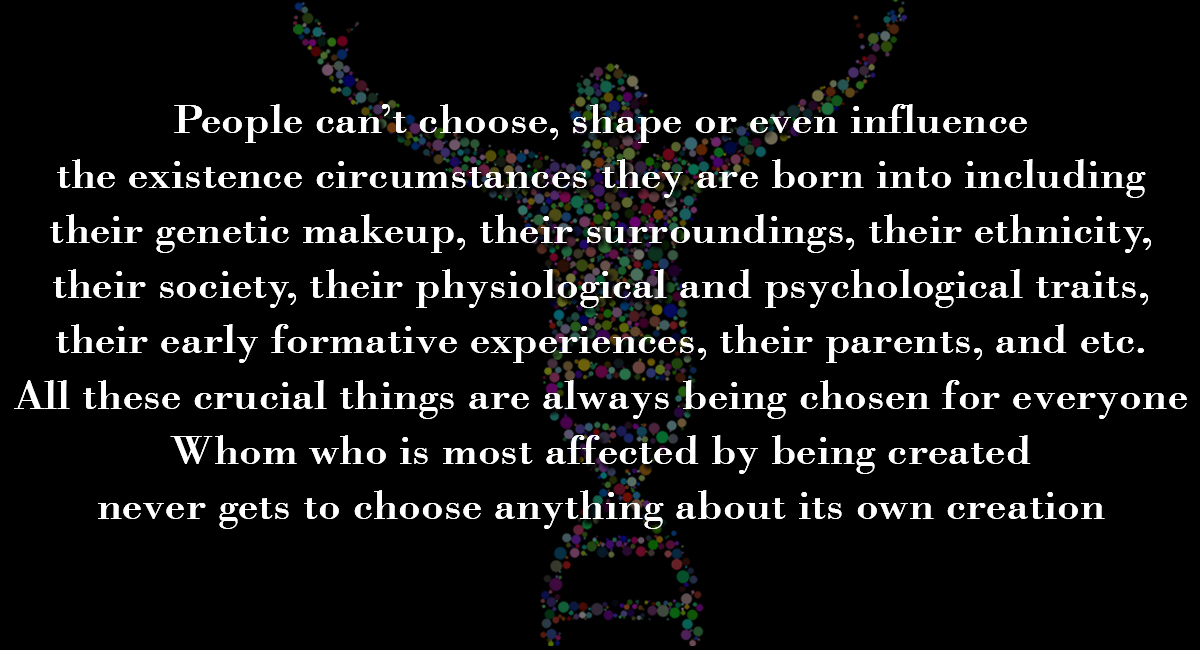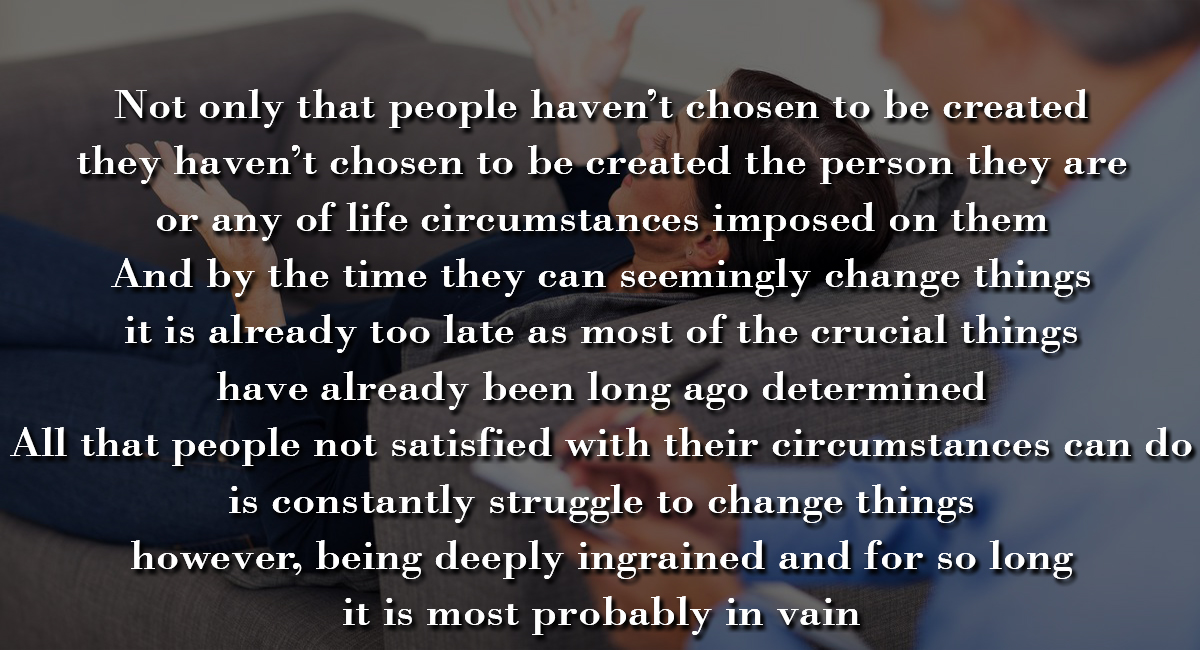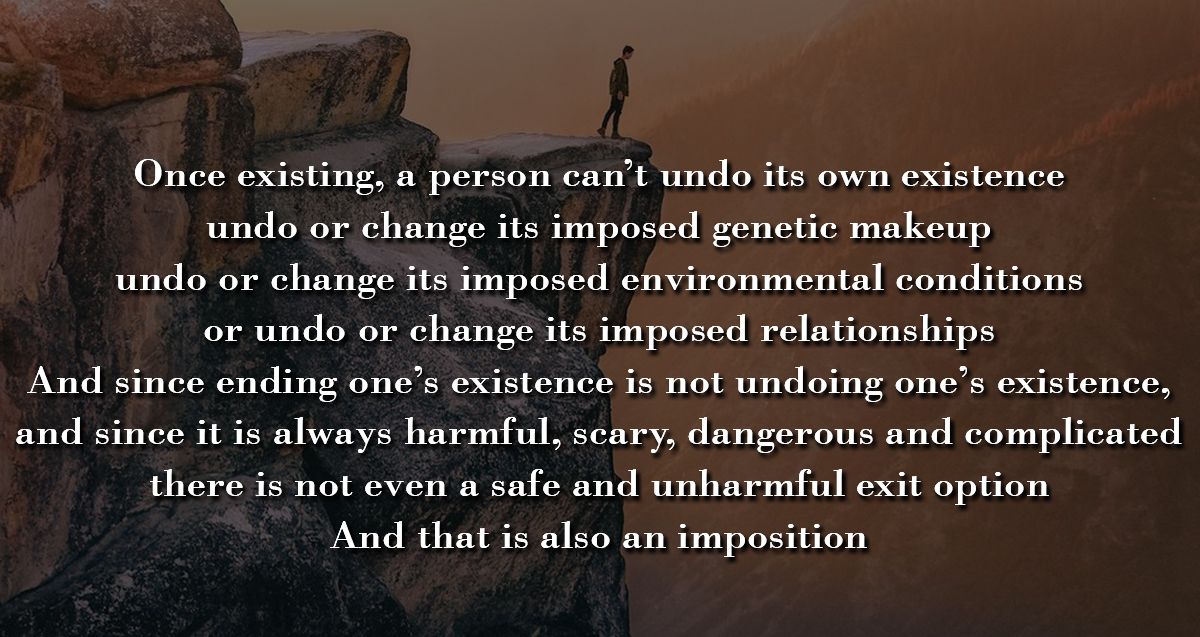In the following text I wish to present what I call the imposition argument for antinatlism. But before I begin, a short clarification is required.
For some antinatalist the imposition argument is another name for the consent argument, which is one of the most common and important arguments for antinatlism, and which I address in another text. However, this is not what I mean when referring to the imposition argument for antinatalism. Although the two arguments have a lot in common and they coincide in some respects, I wish to make here a distinct and independent imposition argument for antinatlism.
While the consent argument mostly focuses on that creating people is subjecting them to harms without their consent – and is therefore an imposition of harms, the argument I am making here focuses on that creating people is subjecting them to a wide but very specific set of extremely crucial formative conditions that will constitute their very existence, yet none of them were chosen by the created people, and it is highly doubtful whether their constituting effect could ever be radically altered – and therefore an imposition of circumstances of existence.
Procreation is always an imposition since it is always throwing a person into specific life circumstances that weren’t chosen by that person.
No one chooses any of its existence circumstances. No one chooses the body they are placed in. No one chooses any of neither their initial physiological traits nor their physiological tendencies. No one chooses any of neither their initial psychological traits, nor their psychological tendencies. No one chooses their genetic makeup. No one chooses their biological sex or their sexual orientation. No one chooses their ethnicity or cultural heritage. No one chooses their linguistic community. No one chooses their religion. No one chooses their geographical location, the city, the street or the house they are born in. No one chooses the social or economic status they are born into. No one chooses their country’s, society’s, family’s historical heritage. No one chooses their country, society, and their family.
Procreation is an imposition because people are being created in a certain point in time, in a certain place, to a certain society, culture, and history, in a certain body, to a certain set of relationships, none of which they have chosen, yet it all deeply and directly affects them.
Since human infants are acutely helpless and therefore are profoundly dependent on other people to care for them physically and emotionally, procreation is an imposition of helplessness, as well as of dependency. People’s imposed helplessness as infants makes them extremely vulnerable to numerous harms such as injury, illnesses, frustration, internal impulses and external sensations which they can’t yet regulate, or any of their physical and psychological needs going unmet. And obviously their dependency on adult care makes them extremely vulnerable to any mistake, failure, inattention, indifference or incompetence of their care-givers.
And this imposition is not temporal as this deep helplessness and dependency has life-long ramifications, for example in the form of separation anxiety and attachment disorder, both may be imposed on people as a result of their imposed dependency on others due to their imposed helplessness as infants.
Because of their deep dependency, people strongly attach to their first care-givers, which are also people’s first relationships. Therefore, relationships with first care-givers have a formative effect on people’s later relationships. They function as the templates on which people enter into later relations throughout their lives. And not only that but, at least according to psychoanalytic thought, people’s early relationships with their first care-givers constitute a person’s basic sense of self and its personality structure. And in any case, because first relationships are chronologically first, because they begin when people are very undeveloped, and because people attach to these relationships so intensely, first relationships have a formative power that no later relationships can have. Subsequent relationships affect what is already established by first relationships. That means that people’s ability to relate is imposed on them by their first care-givers.
When being created people are imposed with particular social power relations in terms of economic status, social status, gender, ethnicity, age (hence ageism), disability and etc. Most people are, in one way or another, victims of, or at least are harmed by, social power relations. And all people are deeply embedded in them.
Since their imposed effect begins as soon as people begin, and since people begin totally unformed, people have absolutely no option to criticize or question any of the social power relations that practically form them. People inherit cultural and social norms that constitute their identity long before they can resist it, and by the time they supposedly can, it is already too embedded in their personality. Therefore, it is hard for people to think critically about them or even to develop the capacities to be critical of them, and when they do, it can only be established on the grounds of and be shaped by the very same social power relations.
In way more senses than they will be ready to admit, people’s initial life circumstances constitute their identity and existence, over which they have no choice.
Procreation is an imposition because people are always in certain circumstances that were caused through their past circumstances and these are always imposed. The circumstances of people’s creation are unchosen by them yet their effect on their lives is unalterable. People’s past always prolongs itself into their present be it in memory, perception, emotion, social status, relationships and various forms of psychological transference.
Procreation is an imposition because no one can ever choose to have or to have not been created in the circumstances that they were created in, and no one has an option to really evade their crucial effect, an effect that in one way or another will be part of every choice and every experience of that person.
Procreation is an imposition because the created person has not chosen anything involved with its creation nor most of the most crucial elements in determining who that person is.
No one is really the person they are because that is what they have chosen out of their own free will. Everybody is a product of genes they haven’t chosen, parents they haven’t chosen, other family members they haven’t chosen, environments they haven’t chosen, society they haven’t chosen, an era they haven’t chosen, shaping early experiences they haven’t chosen, a uterus environment they haven’t chosen and etc.
Most people accept this situation despite that there is something inconceivable about it. Generally speaking, liberal society supposedly highly emphasis individuals’ freedom of choice, but is totally silent about that despite that there is nothing more critical in a person’ life than its existence and the circumstances of its existence in the broader sense mentioned along this text, all of them are not chosen by the created person.
When it comes to each and every one of the factors which will have the most crucial influence on shaping the identity and the life of each person, the created person itself has no say.
And by the time people can supposedly have a say, they are already deeply designed by their non-chosen genetic makeup, their non-chosen uterine environment, their non-chosen living surroundings, their non-chosen earlier formative experiences, and of course by their non-chosen parents. Most of the critical things are determined for a person before becoming an autonomous entity, therefore s/he never really is one in a deeper sense. No one really has autonomy over its own life. No one really freely chooses its own projects, goals, meaning or even its own character. People choose practically nothing of almost each and every crucial factor that has made them who they are, so how can they ever be free to choose who they will be? who they can be? who they want to be? And who they really are?
People are not free to choose what they want in life, but can only make choices from within their pre-given life circumstances. It is the imposed life circumstances that constitute people’s choices. In other words, people’s set of choices in life, are actually a circumstantial pile with each one, in one way or another, being a result of a previous choice, and it all comes down to their initial creation circumstances.
People always make sense of things around them from a particular context. And this context is drawn from a set of factors which were imposed on them such as: their geographical location, their culture, their society, their family history, their class, their economic status, their gender, their personality, and even their physical traits. When people engage in some issue, they cannot set aside their particular creation circumstances and examine it objectively, but view everything from a perspective, one which was imposed by their particular creation circumstances.
So even people’s systems of beliefs, values, and goals, are necessarily imposed on them by their genetic makeup, their surroundings, their shaping early experiences, their cultural heritage, gender, sexual orientation, the country they were created in, the city they were created in, and of course, their parents. Everything the parents are doing affects their children somehow. Parents can’t avoid highly affecting their children, even only for the simple reason that they are deciding everything for them, including where they live, what they will wear, what they will eat, what they do, what they don’t do, who to be with, who not to be with, and etc., during their early age, which is a very, if not the most, crucial stage in people’s development.
And it goes even deeper than that. During the pregnancy stage alone, everything people are doing highly affects their children. From what they are eating, what they are drinking, how they are sleeping, if they are exercising, their stress level, the air they breathe, the smells around them, and what they listen to.
Multitude examples can demonstrate this, but since the harm to others is a super central issue in this blog I’ll focus on an example in that context.
The fact that people are imposed to eat certain types of food, in certain times, since at least in their first few years they are totally depended, is, as earlier mentioned, a serious problem in itself. But the greater problem is that by imposing specific types of food, in specific times, in a specific manner, with a specific body language, with specific sounds and specific smells, in a specific posture and etc., much more than peoples’ taste in food is being determined. Taste in food (and it is important to mention that taste in food is not only determined by the above, but also by the conceiving person’s diet and the created person genetic makeup, however, since these are also not chosen by the created person but imposed, they are relevant to my point here just as much) is much more than merely culinary preferences, and eating is much more than feeding. Eating has much more dramatic effects than shaping one’s taste in food. And food itself has a very dramatic role in people’s lives, and an even more dramatic role in the lives of the ones people view as their food. People who were fed animal based products from day one, people whose mother fed herself animal based products, and people who are genetically inclined to prefer animal based products, would find it much harder to give it up when they are older, even after being exposed to how harmful this preference is for others. By the time these people are supposedly free to decide whether to keep participating in the systematic torture of others, they are already deeply shaped to prefer animal based products. And since humans are extremely biased and irrational creatures, their culinary preferences take a major part in shaping their ethical views as well, which makes it even harder if not impossible to ever change their eating habits.
In some cases, say among people whose cultural background and basic empathy to others make them more inclined towards veganism, but they were imposed by their genetic makeup and their personal nutritional history to prefer animal based products, it may result in a long frustrating struggle between opposite inclinations, a primal physical desire for animals based products against a rational realization that it is wrong. Obviously these people are the least important victims in this scenario, the real victims are clearly the tortured sentient creatures they consume, however, for our matter here, these people are imposed to struggle with preferences that were imposed on them.
Having said that, these kinds of cases are unfortunately rare and were brought here only to illustrate a point. Most people just carelessly consume animal products without a second thought about any of the consequences.
Some may argue that if people are the products of their specific life circumstances that includes their will. I agree, but that doesn’t mean that there is some special synchronization between a person’s will and a person’s range of possibilities. The fact is that there is a huge gap between most if not all of people’s wills and their range of realistic opportunities. Obviously, most people, by the time they are adults, drastically minimize their expectations so to meet their more realistic options. But expectations are not wills. The adjusted expectations may reflect people’s perceptions of their realistic options, which are products of their life circumstances, but they don’t reflect people’s wills. The wills are still there, and people are still frustrated by the huge gap between them and their adjusted expectations, not to mention the gap between them and their actual realities.
In other words, although indeed there is no gap between people’s “true will” and the will imposed on them as a result of their life circumstances, as they have no true will but only one that was imposed on them as a result of their life circumstances, it doesn’t make things better, but if anything, it makes it worse, since the cruel irony is that people don’t get to choose what to want, but do get to be frustrated by not getting it.
Numerous people are stuck in situations which were imposed on them. From abusive parents, abusive environment, innate medical conditions, effects of medical malpractice, undesired personality tendencies, negative mental and psychological conditions and etc., all have crucial impact on the created person and none were chosen by the created person. Not only haven’t we chosen to be created, we haven’t chosen to be created the person we are, in the life circumstances imposed on us. And by the time we can seemingly change that, it is already too late as most of the crucial things (if not the most crucial things) have already been long ago determined, and all that the people who are not satisfied with their share are left with, is constantly, but probably vainly, struggle to change things that so long ago and so deeply have designed their very selves.
Numerous people are miserable as a result of things they haven’t chosen and can’t change. And it makes them even more miserable because they suffer from the situation itself and from the frustration of being unable to fix it.
Probably in other scenarios people would think that it is really unfair that someone has to cope with something that it doesn’t like about oneself, for its entire life, despite not even choosing it. But when it comes to procreation the common answer is that ‘life isn’t fair’ or that ‘you should be thankful because others have it even worse’. But both replies obviously only strengthen antinatalism. The fact that the world isn’t fair doesn’t solve any problem involved in existence but intensifies and nourishs it, since throwing more people into an unfair world is unfair for them and it makes the world even more unfair by increasing unfairness.
And the claim that there are people who have it even worse doesn’t provide any comfort, and it’s also making things worse and more unfair.
No one chooses their initial life circumstances but everyone is obligated to live with their deep and continuous effect. No one chooses them despite that they all have an extremely crucial role in shaping the existence of everyone. In fact, they are in many senses the existence of everyone. No one has really chosen to be who they are. That’s why in many senses everyone is imposed to be the person they are. In that sense the specific existence of people was imposed on them. Some people may feel that they are satisfied with the person they are and with the life imposed on them, but many don’t.
Once existing, a person can’t undo its own existence, undo or change the genetic makeup forced on that person, undo or change the environmental conditions forced on that person, or undo or change the relationships forced on that person.
And there is not even a clean, safe and respectful exit option from any of that, so how is it not a case of imposition?
Suicide, which is by all means not undoing existence, as explained in the text about suicide, is a horrible, harmful, scary, dangerous and always complicated option.
Forcing someone into a situation with no good exit options is an imposition.
Creating people is not only forcing them with the very fact of existence, but also with everything involved in it. Most if not all of the most crucial aspects of people’s existence were imposed on them. People can’t consent to the very fact of their own existence, nor any of the initial circumstances of their own existence, nor can they radically offset the effect of the initial circumstances of their own existence. Given that existence is necessarily imposed on everyone being created, all the more so everything involved in it, no one should be created.
References
Stone A. Being born: Birth and Philosophy (2019)
Oxford University Press DOI: 10.1093/oso/9780198845782.001.0001



Leave a Reply